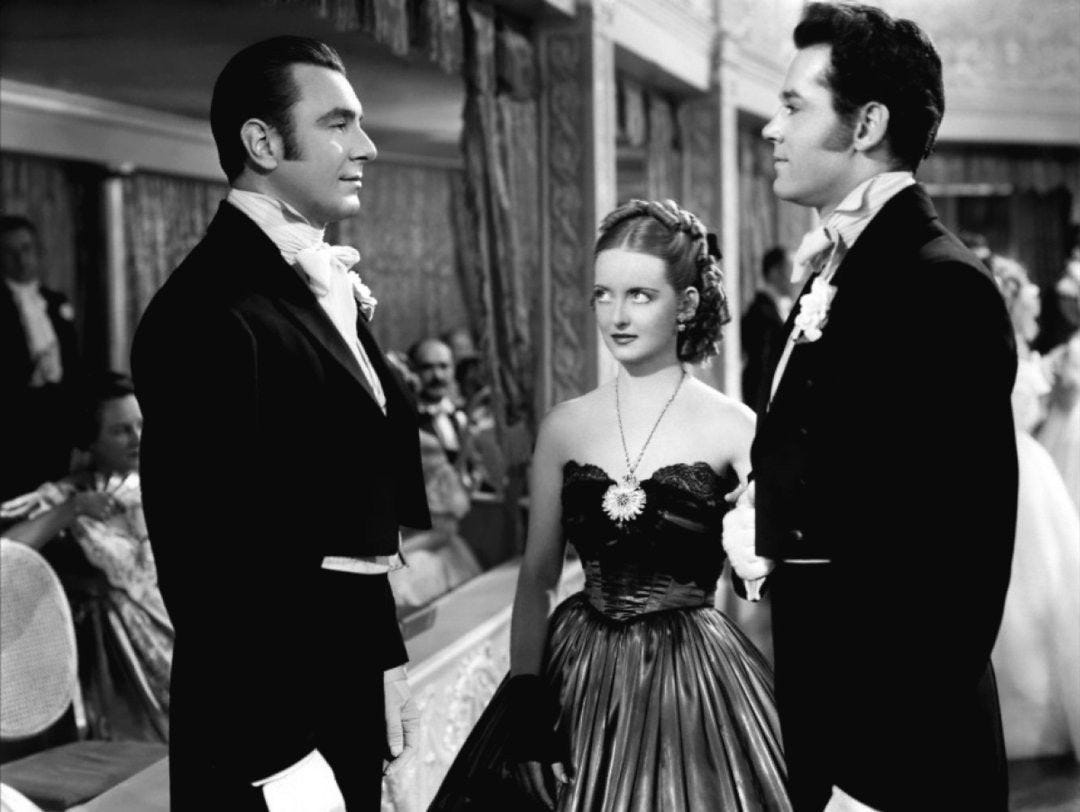How "Jezebel" Changed Bette Davis's Career
It’s pretty easy to consider 1938’s Jezebel a sort of Gone With the Wind-lite. The movie came out two years after the Margaret Mitchell book, it’s an antebellum story about a flirty bad girl who has to get wise to herself, there’s a major crisis, and the music is written by Max Steiner. It was the film that made Bette Davis a huge star and secured her a second and final Oscar win. It also made her a serious contender for the part of Scarlett O’Hara, at least at first.
Here’s a bit of the plot: Julie Marsden is the cream of 1850s New Orleans society. Rebellious, spoiled, and headstrong, Julie acts first and thinks later; she believes her status is assured no matter what she does.
That is, until the night of the Olympus Ball, when all the unmarried girls are wearing white. And what is Julie’s crime?
She wears a strapless red dress. Gasp.
Almost immediately, Julie’s life falls apart. Preston, her beau, had warned her not to wear red, and now that she has he keeps her on the dance floor long enough for the entire party to see her. Each of them back away as if Julie has the plague.
A year goes by, Preston goes north, and Julie barely leaves her house except to ride her horse. Her aunt is worried about her, but Julie’s attitude abruptly changes when the family finds out Preston is coming back. She flutters around the Marsden plantation house, fussing with flowers and smiling, only to find out Preston has brought his new wife, Amy with him.
There are bigger fish to fry, though, because a yellow fever epidemic is approaching and nothing else will matter.
The common behind-the-scenes tale around Jezebel is that it was a consolation prize for Davis after she lost the role of Scarlett O’Hara in Gone With the Wind. However, I disagree with this because the dates don’t line up—Jezebel wrapped in January of 1938 and casting for Scarlett wasn’t finalized until one year later. Not only that, but Warner Bros. had talked about casting Davis in Jezebel, which was based on a play, as early as 1935. Gone With the Wind was another matter entirely.
Almost half of those surveyed wanted Davis to play Scarlett, but what ended up killing the deal was Davis herself because she would have had to play opposite Errol Flynn as Rhett Butler. Davis held out for better, which is understandable because Flynn would have been a rather wan Butler, but Selznik decided to move on. Funny thing, but in after years Davis would blame George Cukor for her passing-over because, as she claimed, Cukor hated her.
While it would have been interesting to see Bette Davis as Scarlett, it also would have been ludicrous in my opinion, because as an actress she just may not have been ready. Davis’s earlier work is a teeny bit hammy although intense and competent, and she had a habit of wiggling her hips, running her lines too fast, and wagging her head, the latter so much so that according to TCM, Jezebel director William Wyler threatened to put a heavy chain around her neck. He spent extensive time helping her hone her acting technique, as well as on other pursuits, as Wyler and Davis had a passionate love affair.
Davis’s new style made for a great performance. Her Julie purrs and simpers in the first act of Jezebel, rises out of a self-punishing stupor in the second, and pleads for redemption in the third. The viewer comes to loathe her and stays to root for her. It’s a sumptuous character sketch in a sumptuous but not entirely idealized setting that seems to be living on borrowed time. It was the film in which Davis really came into her own.
Could she have sustained that energy as Scarlett? It’s hard to say, especially with so much hindsight, as no one can look at Gone With the Wind without thinking of Vivien Leigh. Bette Davis’s next movie would be Dark Victory, about a woman who suffers from terminal brain cancer. She may not have been Scarlett, but she had become the actress she was meant to be.
Jezebel is currently streaming on HBO Max. Not rated.
My grade: A+
Principal cast: Bette Davis, Henry Fonda, Fay Bainter, Donald Crisp, George Brent, Margaret Lindsay, Richard Cromwell, Henry O’Neill, Spring Byington, John Litel, Margaret Early, Gordon Oliver, Janet Shaw, Eddie “Rochester” Anderson, Theresa Harris
Directed by William Wyler.
Written by Clements Ripley, Abem Finkel, John Huston, Robert Buckner, Owen Davis, Sr. (original play)




